|
Grenada
The Spice of the Caribbean Fall 2007 |
 |
Beautiful ship Peter found in
Prickley Bay.
Beautiful ship Peter found in
Prickley Bay.
|
||
| December
1-14, 2007 |
|
Down to the wire:
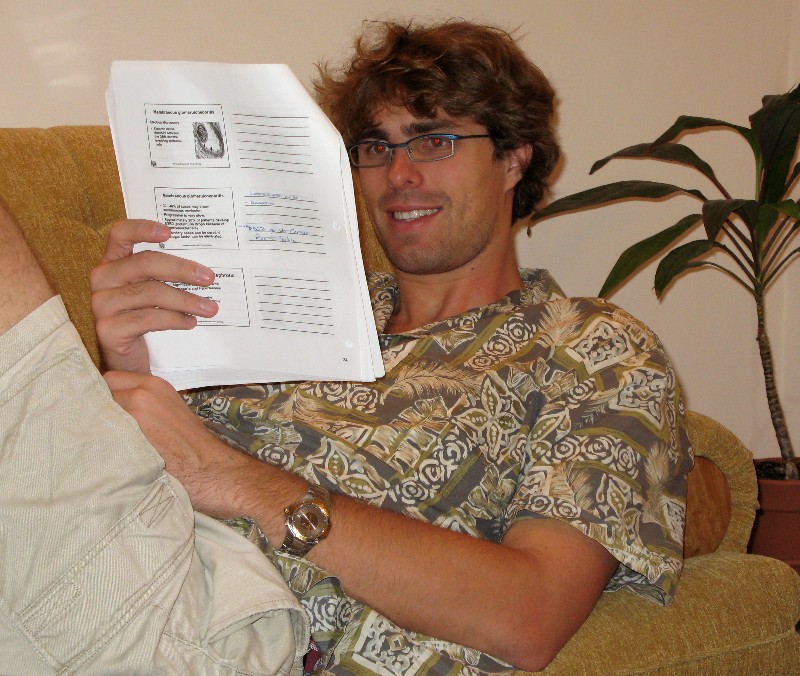 Peter studies, and studies, and studies! |
| THE COURT SAGA CONTINUES... It is hard to keep track of all the
court dates my friend has attended since her burglary in October
2006. There have been three
in the past month alone.
I don't know if the progression of events is more difficult to track...or to make sense of. It's quite possible that all of the parties showed up for the first hearing, but I can't remember the last time that even happened that I was there. Evidently, even the "prosecutor" had a turn at failing to appear. Mostly, it was defense counsel that did not show up in my friend's case, but from what we saw, the police witnesses were the most likely not to bother to come - or to be ordered to come - or perhaps to simply be informed of the court date. For over a year and on the eve of about a dozen court dates, my friend had to prepare herself for the possibility of taking the witness stand, entirely unprepared by any professionals, and in an environment where it is challenging to hear, let alone understand what is being said. This semester, the case moved onto a new magistrate's courtroom: this one is smaller, air conditioned, and enabled improved comprehension of the proceedings. However, it was still a struggle to hear the voices speaking (often due to the very low volume of the speaker,) to understand what was being said given local terminology and accents, and to make sense of the courtroom's procedures. 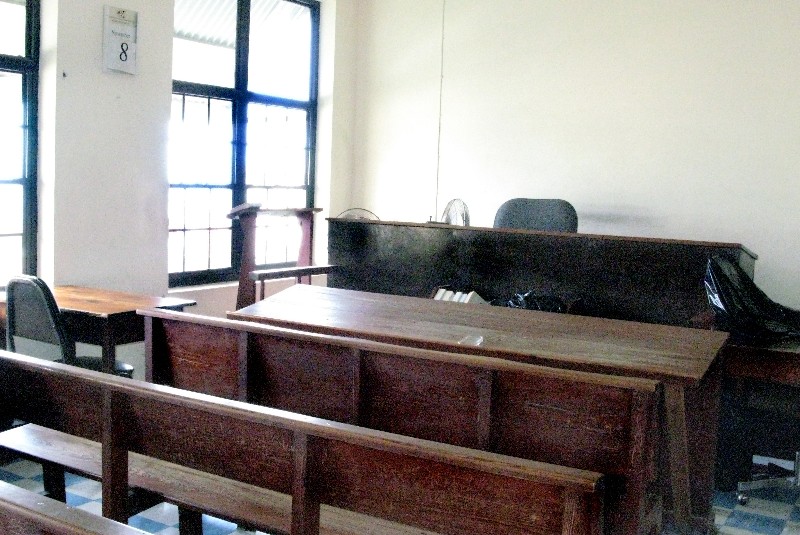 The new courtroom: the police prosecutor sits at the tiny table and chair on the far left, any defense attorneys occupy the bench immediately adjacent to the police table, the witness stand (literally, a stand) sits right in front of the police table, at center stage is the magistrate's bench, and to the right of her bench sits a small table occupied by a computer ( which is perpetually covered in plastic and never used) and a clerk. Defendants typically stand in front of the clerk; occasionally they stood in the bench behind that occupied by their attorney. As each of 30-40 morning cases is
called (we never could figure out the order they were called in,) the
police representative calls out the name of a defendant or defendants,
and a police "bailiff" hollers that name out into the hallway - i.e.
the great outdoors. I say "police representative" in lieu of
"prosecutor" because it was our understanding that the government's
prosecuting representative need not be an attorney. I have no
idea if the representative that we typically saw was an attorney or
not. The names of possible witnesses are also stated (or
whispered, as the case may be) by the police representative, and those,
too, are repeated (this time loudly) by the bailiff - often with no
persons responding to those calls. For defendants with an
attorney (none are ever provided for free,) counsel were keen to howl
about the common absence of police officer witnesses and the undue
delays this caused.
The defense attorneys themselves were an interesting bunch. We saw just a few, and the same ones (if any at all) every time. As they waited for cases to be called, the attorneys were very informal, often bantering and laughing among themselves - and occasionally even at unrepresented individuals...and accomplishing very little in the way of work even when their cases were called. Often they failed to show, and the court clearly accepted the notion that attorneys were needed in other courtrooms as well. However, there was zero effort made to avoid such time conflicts when new court dates were set. In fact, in my friend's case, defense counsel failed to appear on Nov. 9, and the magistrate planned to avoid a repeat of this occurance by asking the defendant to relay the new court date to his attorney: the court evidently does not perform this duty. On the next date, Nov. 30, he again failed to appear...there was no evidence he was ever informed of the date. My friend expertly expressed her frustration with the court, again noting for the Magistrate the number of her appearances to date, and her now imminent departure from the island for the holidays. The Magistrate heard her loud and clear, and set the date over for a few days, until just before her departure. We learned, or at least observed, a few things at the last couple of court dates. I ran into a Grenadian friend of mine who I know from the prison project, and he told me that he was once an officer, and left the force in part due to the lack of professionalism and accountability in regards to following cases in court. According to him, there is no good reason why the officers rarely show up. In addition, he had apparently been waiting outside for some time and knew which defendant was involved in my friend's case by the particulars he heard the defendant speaking of with his comrades as everyone waited outside. He told us that the defendant claimed he plead guilty, which we found very curious. There certainly had not been a guilty plea, and the last my friend was informed, the next court date is to be a trial (this has been the case for some time now.) Court files, as noted previously, consist of tri-folded pieces of paper. Each charge involves a separate mass of tri-folded papers. It is a mystery how these packets can be filed away and retrieved with any efficiency when they don't even have tabs on them and everything seems to be hand written out on forms. Some attorneys maintained tri-folded packets of client information, one had an actual file, and others seemed to bear no paperwork whatsoever, asking clients standing nearby the answer to every little query asked by the court. Every time we were present, cases were mysteriously dismissed by the Court, sometimes with the defendants present, and sometimes not. Dismissals did not happen at the motion or request of the prosecutor, and no reason was ever given as to why cases were dismissed. In fact, we never saw any evidence of a single written motion, and the size of the files available to the professionals would lead to the conclusion that written filings are rare, indeed. 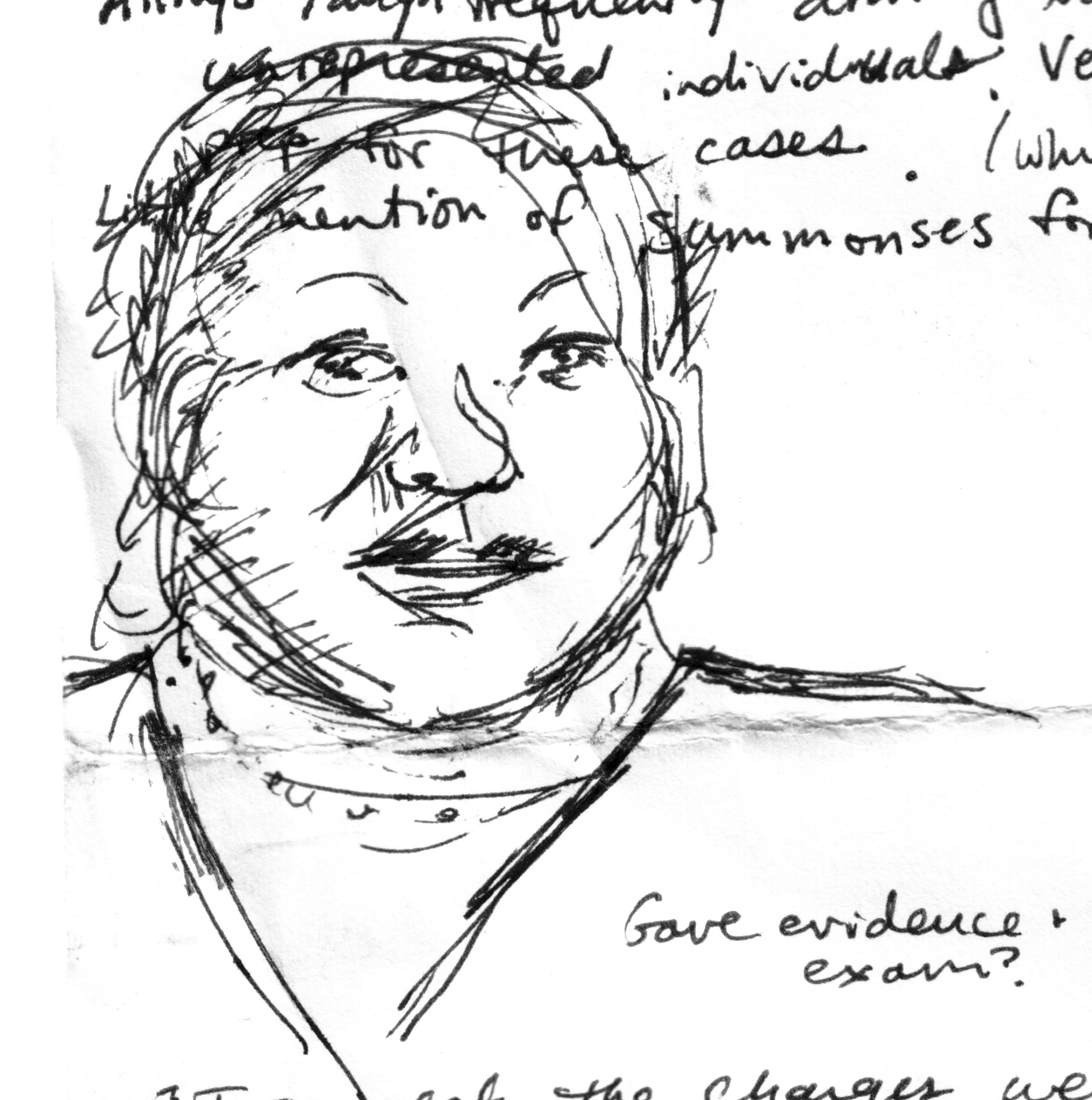 I did not risk taking any photos in this courtroom. Above is a...non-artist's...sketch of the Magistrate, Her Worship. Defendants failing to appear were no cause to issue warrants or subpoenas of any kind. The court simply set a new date if any persons failed to appear. There are no victims advocates or court liaisons in Grenada. (I refer here to the judicial position of victims' advocate, not of being in the position of advocating for victims, as the Legal Aid and Defender Clinic certainly does advocate for female victims of domestic abuse.) I watched as a police officer re-seated a defendant, whose case was set to be re-called, right next to his alleged female victim of assault. The lack of this particular position affected my friend directly, as she was often uninformed about the process, she received only one subpoena in all the whole process, and she was aware of court dates only because she attended every hearing but one. We noticed that cases seemed to entertain witnesses in a piecemeal fashion: as they were available. Once a proceeding began, there was no impetus to finish a witness through cross-examination, nor to conclude the event by hearing all of the witnesses in succession and then reaching a ruling. We listened as some cases were recaped by the Magistrate, who mentioned which witnesses had taken the stand to date, and which had not. There was one such case in which she described a witness as having been examined on direct, but not cross. What's more, there she did not relay a date when the witness' testimony was to conclude. Proceedings are concluded at the convenience of the parties. The November 9th hearing involved a few high points. In one case, a defense attorney made an impassioned speech where he accused a non-appearing victim of never intending to appear for another court date. He did so by speaking of the victim's surname, stating that the name did not seem "Grenadian," and implying, therefore, that the court should not proceed against his client as the victim may never show up. Defense counsel: "I'm not saying the person is not Grenadian, but it doesn't take a rocket scientist to conclude this person might not be Grenadian." There was no mention whether the victim was even a witness, let alone a key witness. There was mention that the prosecutor had possession of the witness' phone number. Defense counsel's brilliant stance emphasized a few reasons why crimes against students are often never brought to justice: the police are out of touch with their witnesses, prosecutions lacking the presence of victims just don't happen (regardless of the evidence the police may have), students don't always come to court, and they are simply are not around long enough to see the conclusion of drawn-out proceedings. The poor showing of the police continued down a regrettably abysmal path. At times, it was embarrassing. The prosecutor was sometimes a complete loss; he could only have hoped to be elevated to the status of a Keystone Kop. More than one defense attorney made bald-face accusations of incompetence on the part of the police, who could not account for the whereabouts of many of their witnesses. Accusations were made that the police possessed witnesses phone numbers, and failed to even inform witnesses of court dates, let along assess whether they would appear...let alone subpoena them (although this formality was never brought up.) The prosecutor could never relay when his last contact with the victim, or some other sought after witness, was. The defense in one case went on to speculate that a missing student-victim would be leaving the island soon, at least for the holidays if not for good. When a new court date was proposed, the question of when classes concluded came up. Naturally, no one knew when classes ended, so the prosecutor turned to us (the only white folks in the room - as always,) and asked when classes ended. My friend, with appropriate curtness, declared that she was not a student, which amused many as the Magistrate pointed out to the prosecutor that not all white persons are SGU students. Certainly, in the States, many attorneys imply that their adversaries suffer from such grave incompetence as to be useless to their clients or the court, but this is done so by demonstration: by asking specific questions and forcing the other party to answer questions relating to their duties as an officer of the court. Preliminary hearings would have avoided many of the accusations as well. However, in the Grenada courtroom, attorneys allege incompetence by accusation without any formal or specific inquiry - it sounded more like proselytizing than lawyering, as if the law were faith-based. 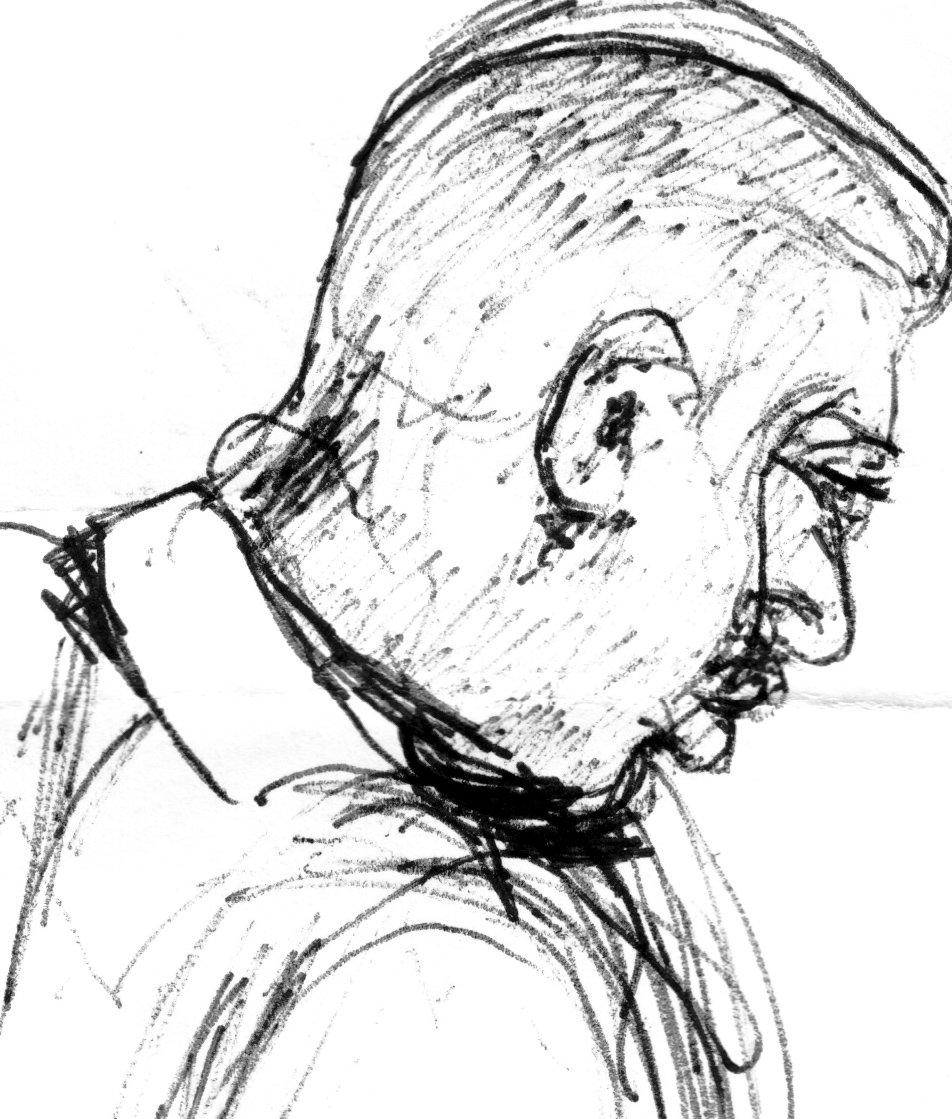 The police prosecutor, or representative...hunkered over his tiny table as usual. The attorneys themselves made a poor showing at times. When one defendant appeared alone, the magistrate inquired of an attorney present whether he represented the individual in question. The attorney responded that he had represented the person in the past, but was unsure if he presently represented the person. No effort was made on his part to clarify the issue regarding the case in question. Finally, there was an interesting case in which a defendant was, in the course of the alleged crime, shot by the police. He spent 13 months in the hospital, or otherwise recovering. (This attorney had no file and had to inquire of his client every little detail of the case.) The attorney again made bald-face accusations of the police, offering no evidence, but asking the court to dismiss the case because, in his words, "I suspect the charges were brought to justify the shooting." The November 30th hearing was very elucidating, as we watched two witnesses take the stand in another case. As seems to be par for the course, these were simply two random witnesses in the case as a whole, taken as they showed up in court. One witness was accepted as an expert: he was a physician who treated a person involved in the case. The witnesses had to swear to God, on a Bible, that they would tell the truth. They stood at the witness stand. The persons called were police witnesses, and the police representative used what would be considered in the US as leading questions almost exclusively. The prosecutor spoke very slowly, and there were long pauses between questions and statements because the Magistrate transcribed everything that was said by hand. The police prosecutor was still hard to hear or understand as his habit of mumbling into his table continued unabated even when questioning his own witness. He also had the habit of repeating the responses of his witness. There appeared to be limits on refreshing recollection and the physician's ability to refer to his notes. When objections were made, there were long delays before any ruling - it seemed as if the Magistrate was waiting for the attorney to convince her to rule in his favor instead of ruling on the merits of simple objections. The prosecutor elicited about one quarter to one half of the relevant information he could have, or should have, gotten out of each witness, especially his expert. At the conclusion of the questioning, there was a particularly long pause. Then the magistrate read back the witness' testimony and asked the witness if it was accurate. The witness then had to sign the hand transcription to note that it was, in his opinion, accurate. 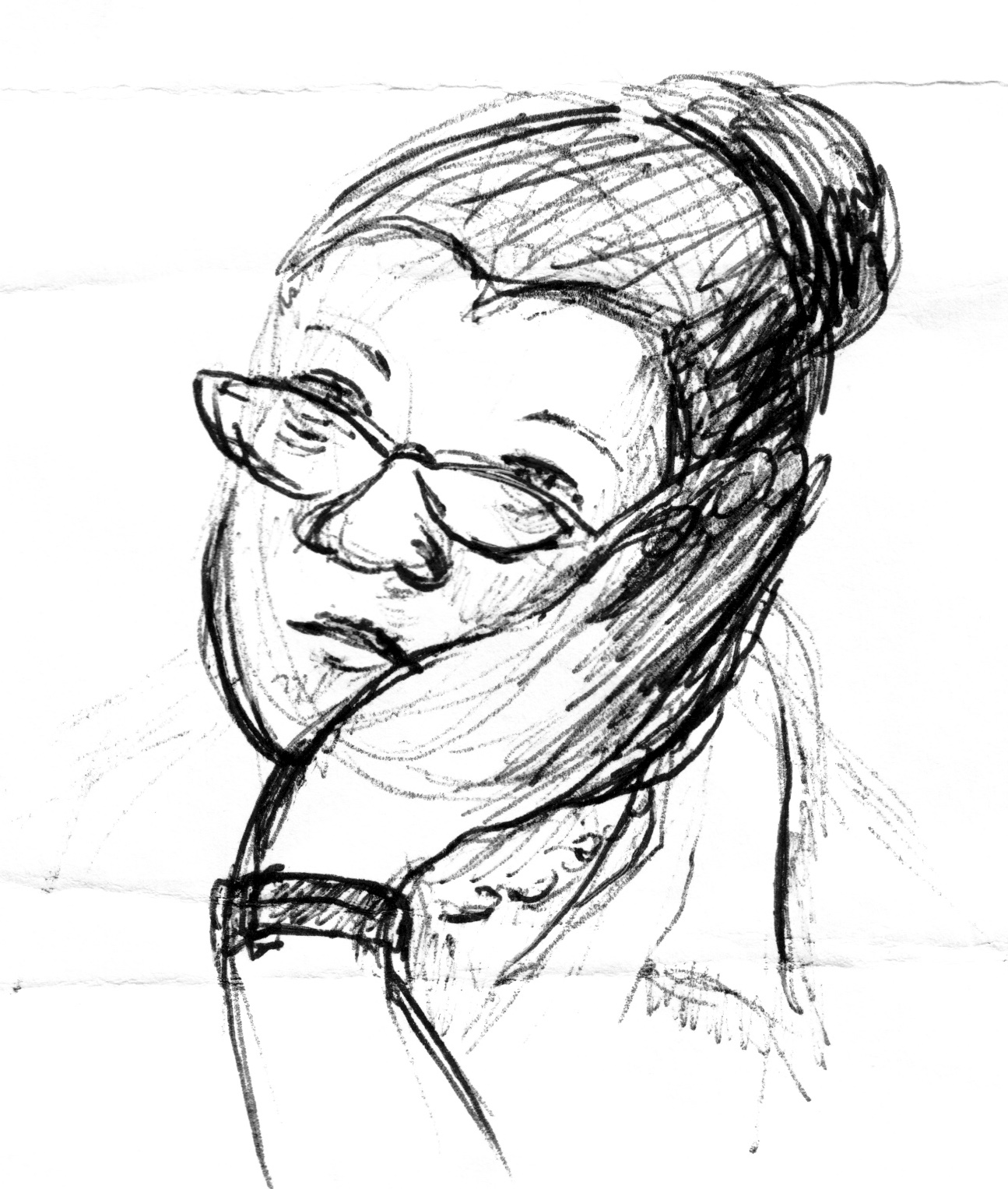 The Court Clerk was thrilled with the witness testimony. We returned to court on December 4th, when we had no confidence whatsoever that defense counsel would appear. This time, we were surprised that all the parties were present. (Except, of course, for the police detective...who I never once saw show up for my friend's case.) It turns out there was no need: the defendant plead guilty after all. In the US, this case likely would not have been prosecuted without a confession and guilty plea, as the connection between the crime and the defendant would have been far too circumstantial. (The defendant evidently made some semblance of a confession at the outset, and helped authorities locate some of the missing items. He went on to plead not guilty, though, and then fourteen months elapsed.) The Court proceeded to immediate sentencing. The defense attorney actually did some real work during the hearing, advocating for his client, making a well spoken apology to the victim, and positing a persuasive speech discussing the merits of bringing criminals victimizing University students to justice - the crux of the argument being that the country of Grenada should protect students, as they mean a great deal to the economy of the nation. It was really an argument for the prosecutor to make, but defense counsel did a much better job than the police could have managed anyway. It was a curious stance, not only beacuse it ran counter to his client's interests, but it was just plain ironic because the system is so stacked against students finding justice. The likelihood of a student actually being able to miss so many days of school for court...and to still be around after fourteen months even for a simple guilty plea...is all so minute. My friend had no opportunity to address the Court prior to the ruling. Even after the ruling, she was limited to inquiring about the logistics of the Court's orders. Just the same, my friend stuck it out to the end, despite the odds. She was rewarded restitution in the amount of the value of the items she had not yet had returned to her. The defendant, though a minor when the crime occurred, had since turned 18, and he was ordered to pay the court within thirty days, or risk a prison sentence. In January, my friend collected her restitution and was very pleased the matter was finally resolved. For my part, I was very interested to be a public observer of the process. |
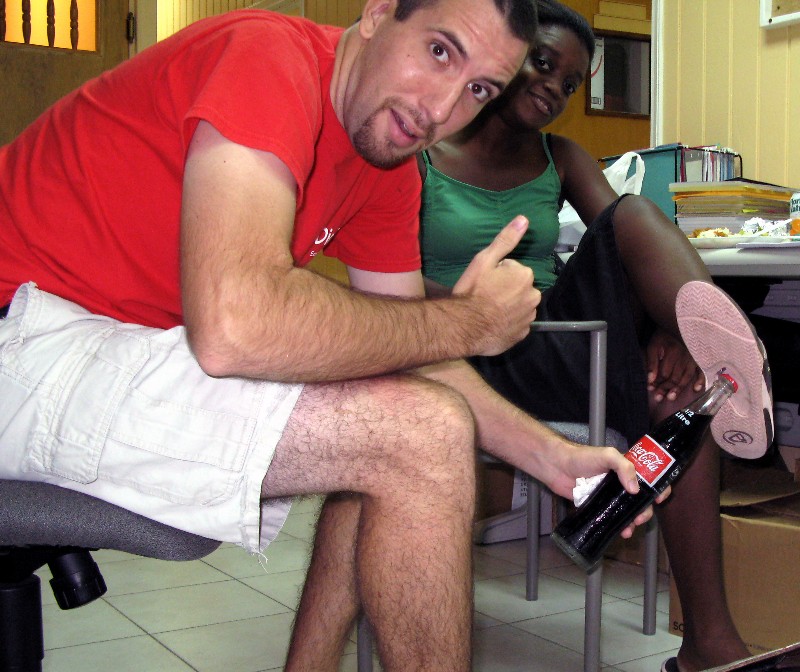 Josh makes use of an improbable new
discovery while he is hard at work: shoes with a built-in
bottle cap opener. Josh makes use of an improbable new
discovery while he is hard at work: shoes with a built-in
bottle cap opener. |
|
Anna hosts a celebration in honor of
Britney's completion of her MIB (Masters of International Business.)
  Jonathan tests out his handiwork 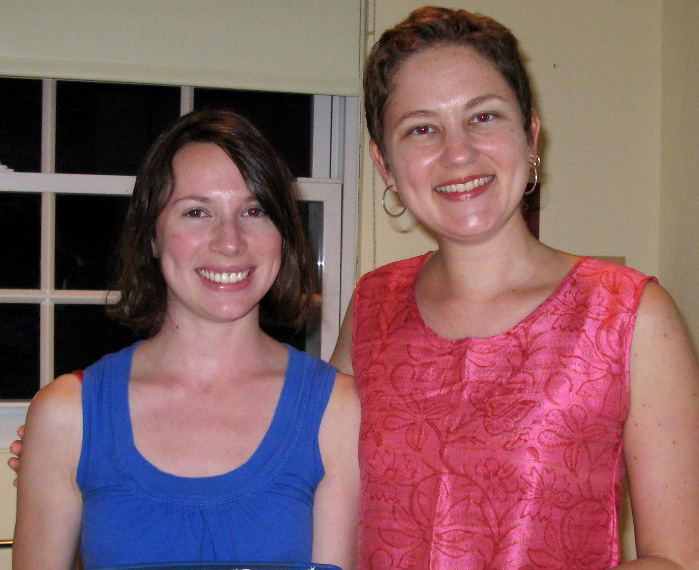 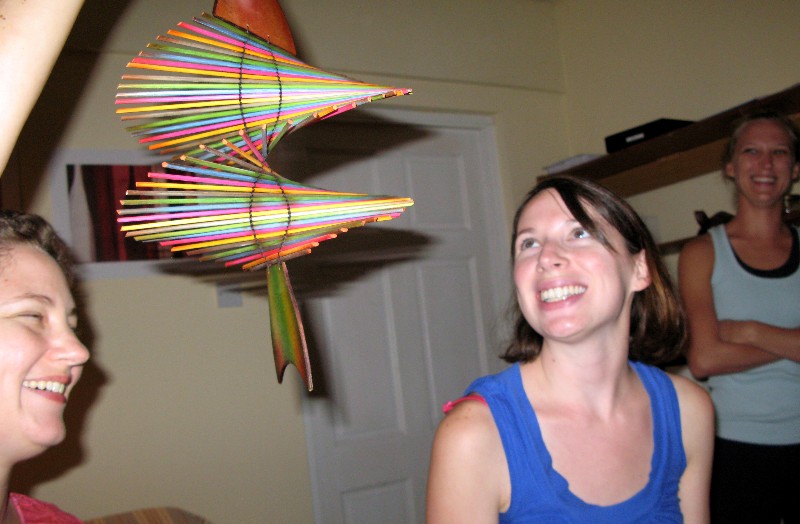 Britney gazes on in wonderment...all that hard work for WHAT? |
|
Sunset, sipping cooling
beverages, on Noga's veranda.
 |
By
the end of the semester, the SOSes turned into the Breakfast Club, as
it was the time most likely folks could actually get together.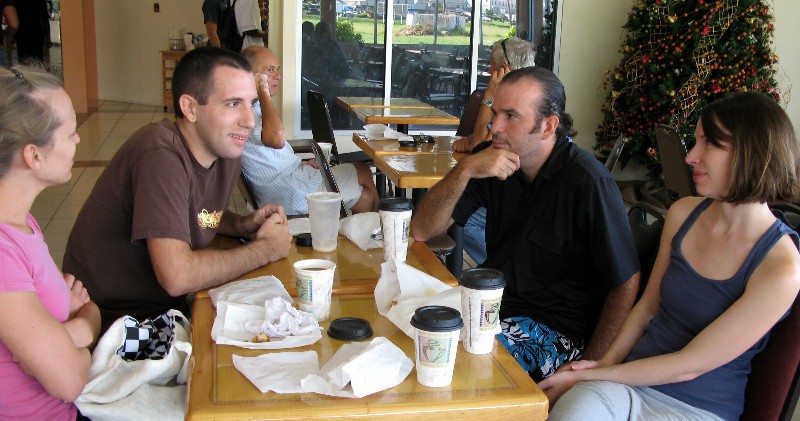 Rituals. 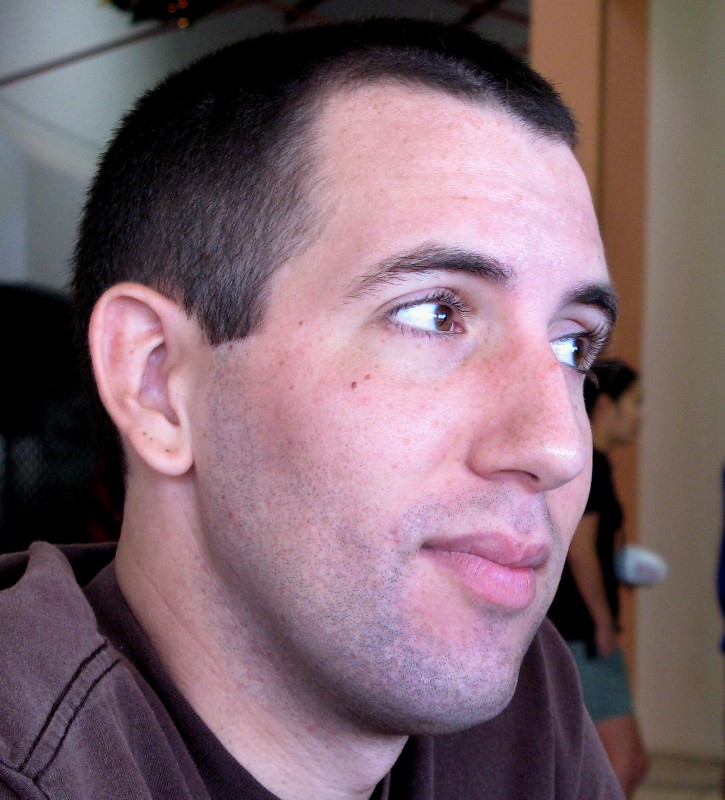 Modern Day Gilligan turns back the clock: Josh debuts his brand new, shorn, nubile look. |
|
Liana and I have been
working together for over a year now: this semester being by far the
most intense. Liana has been a great trainer and friend in the
past year, bringing me to a level of strength and fitness I could not
have achieved left to my own devices...all of which greatly improved my
hockey game, too!
 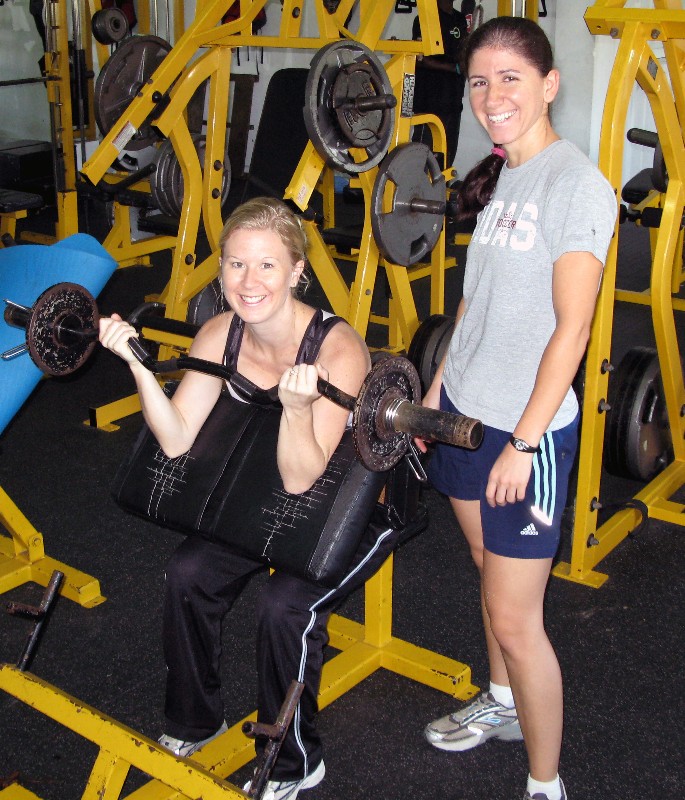 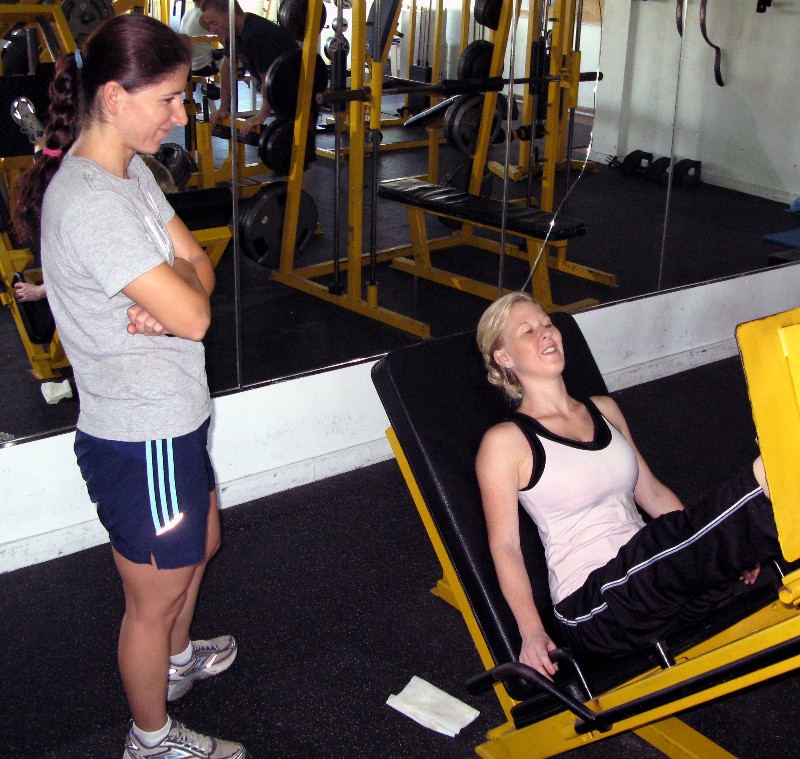 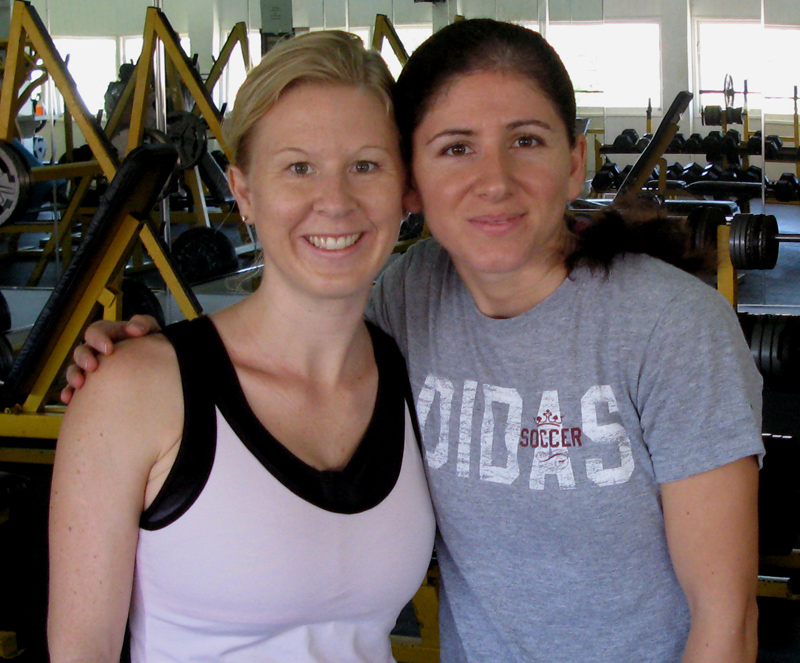 Client and Trainer. 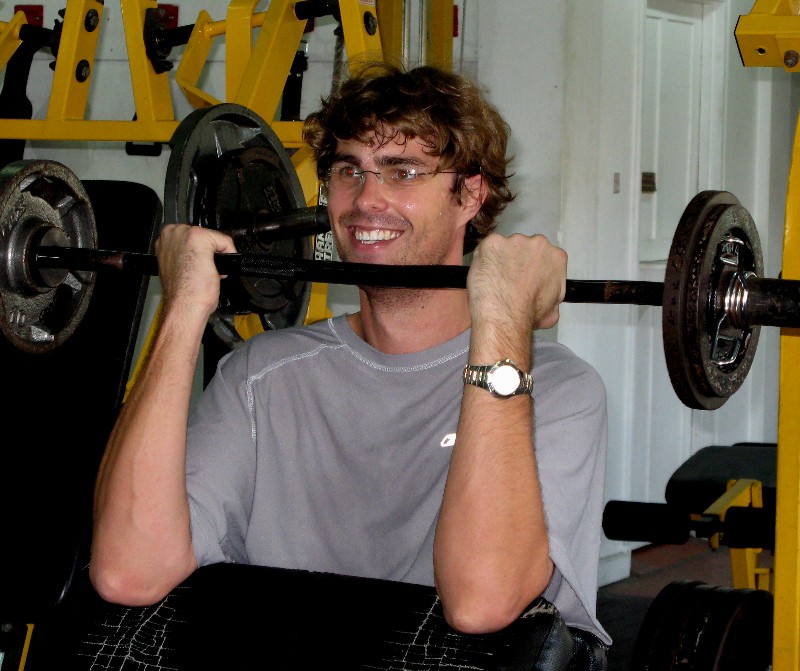 Peter gets tired of losing
wrestling matches to me and starts to hit the weights too! Peter gets tired of losing
wrestling matches to me and starts to hit the weights too! |
|
Dad's Mammoth Sunflowers
love the tropical climate:
  They grew to five feet and bloomed in the time it took their neighbors in the forefront of the right photo (cosmos and zinnias) to sprout a few leaves! |
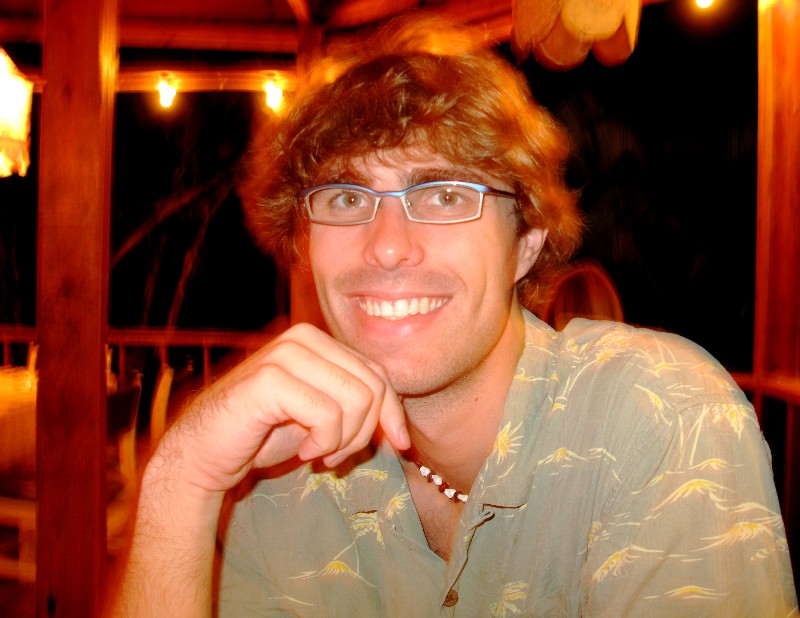 The Man of the Hour. The Man of the Hour.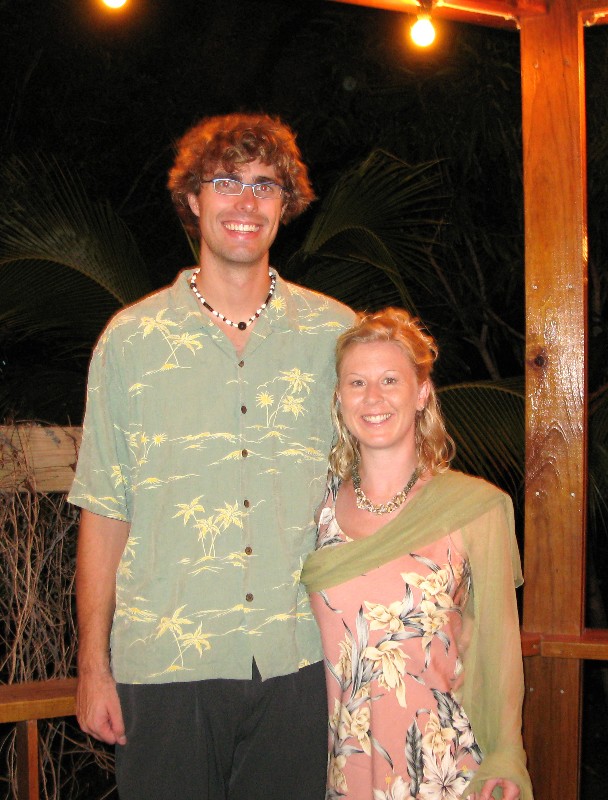 We celebrate Peter's
completion of his largest final with a delicious Italian feast at Mona
Lisa's.
|
 DES had a holiday office party this year, which Heather B. graciously hosted at her perfectly gorgeous new home. Although I had not been working for a few weeks by then, I was welcomed just the same. Above is just the beginning of the food brought by faculty and staff. Not only will I miss my co-workers, but I will miss all of their fantastic cooking! 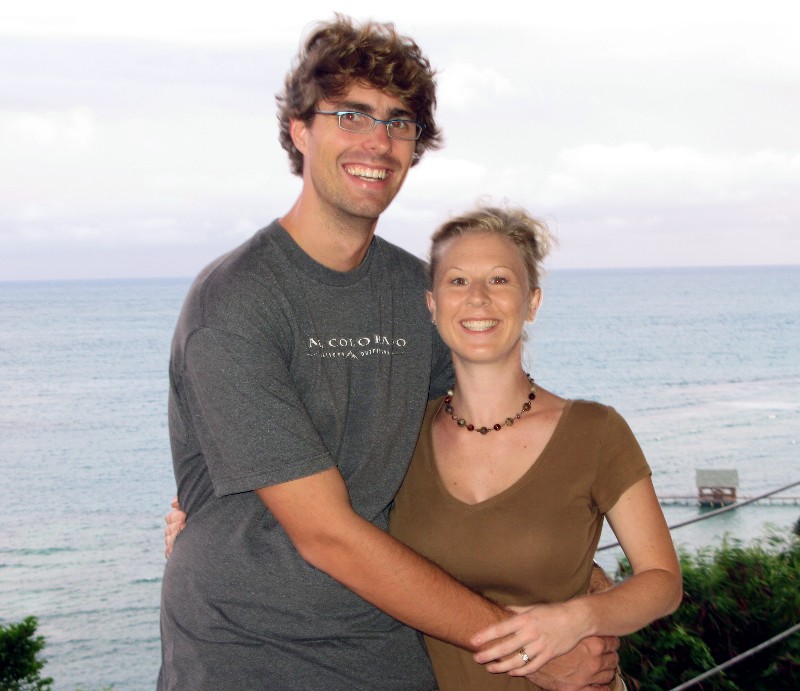 Even Peter got to join us! Photos can't possibly do justice to the scenery. The home has an amazing porch, hugging half of the house, and curving along the peninsula on which it sits. The living area has two enormous, sliding glass doors (walls, really) that open like barn doors to the great outdoors. Walking through the opening out to the porch is like stepping into another dimension where the sea and the sky and the land all converge, yet each seems to go on in every direction...to infinity. 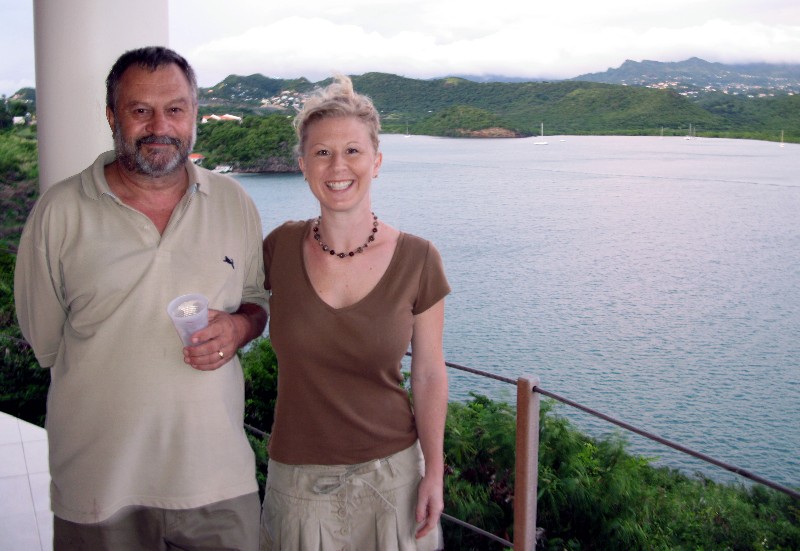 DES Director Andre and Heather 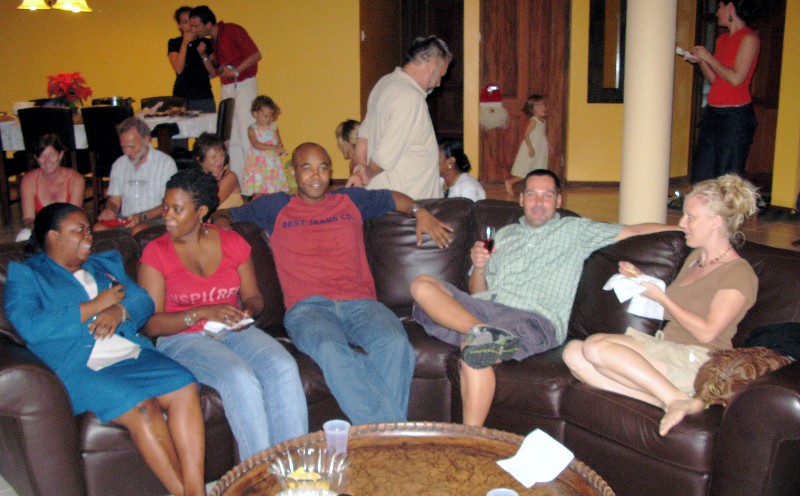 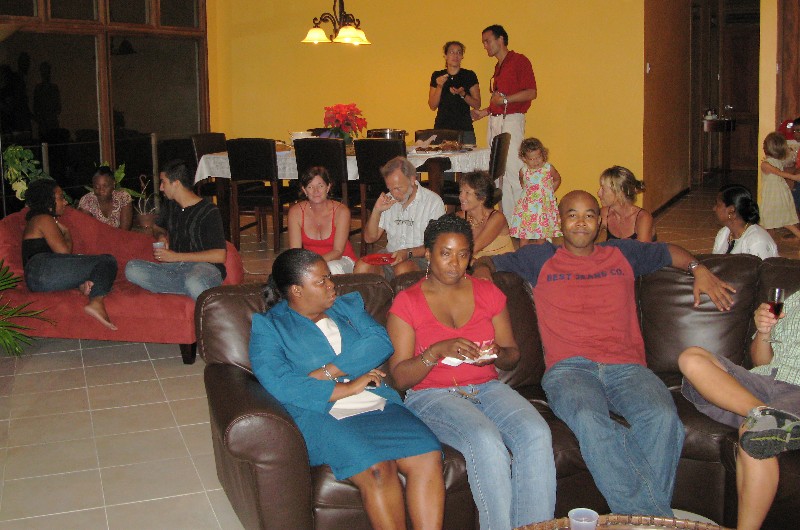 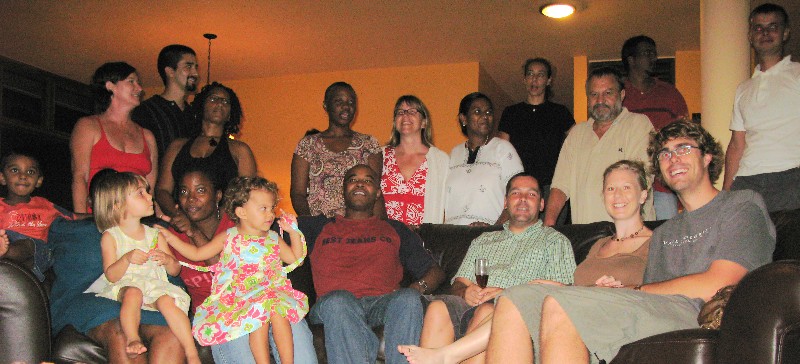 Much of the gang. Sitting: Nakazi, Sofia, Corisse, Sadie, Tristan, Aris, Heather and Peter. Standing: Kevin, Heather B., Brad, Sacha, Althea, Sara, Serin, Franchesca, Andre, and Greg. 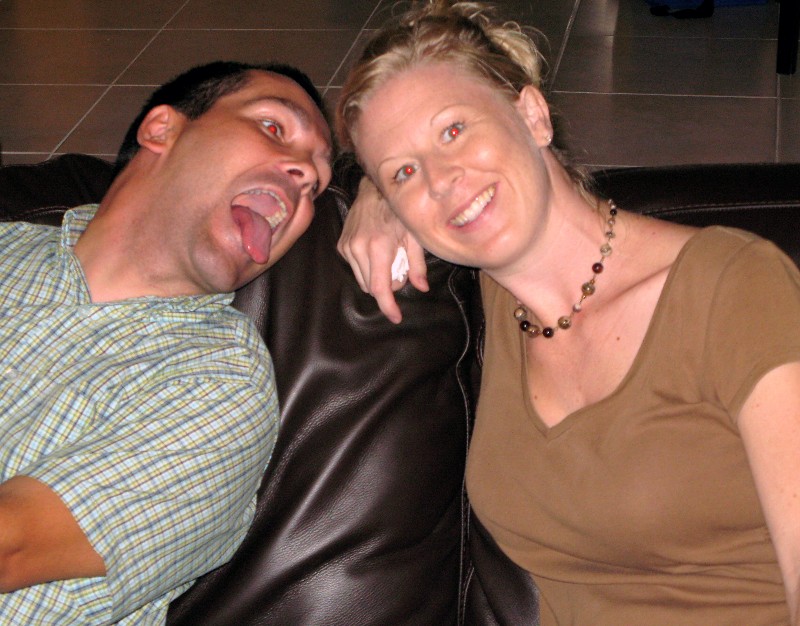 Aris, his usual self. 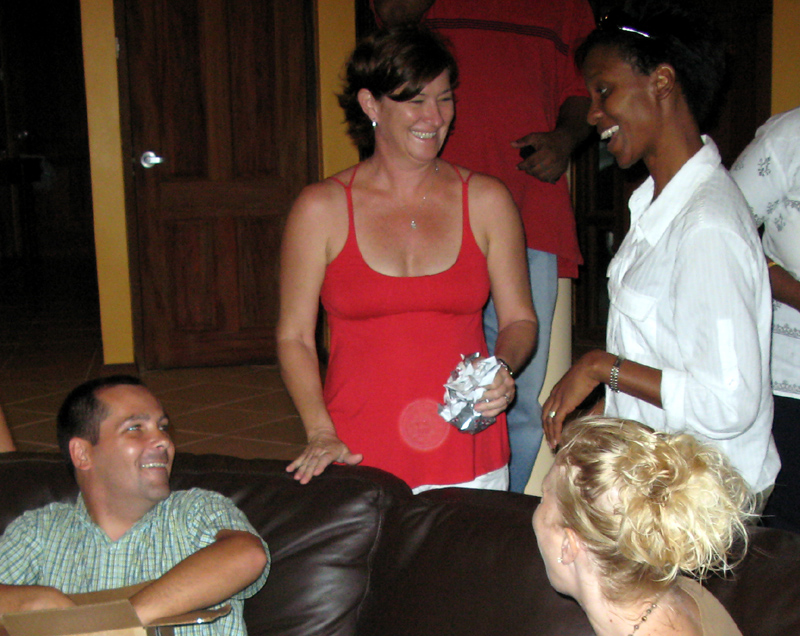 Aris, Heather, Arlette, and Heather. Heather B. was our gracious hostess. |
I
finished another jewelry project: Jennifer's cow bracelet. It
features tiny porcelain cow beads, which I painted with my "scanning
electron paintbrush" and then lacquered. Liana treats me to dinner at one of my favorite restaurants: La Belle Creole. 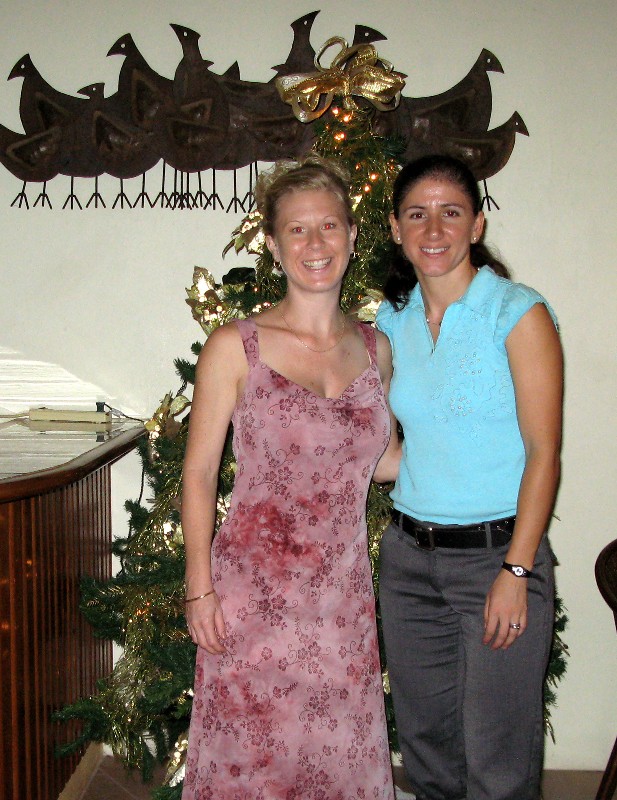 After dinner, I pick up Peter and we head to Savvy's to meet up with friends, then move on to an end-of-semester party at Mi-An's waterside home. 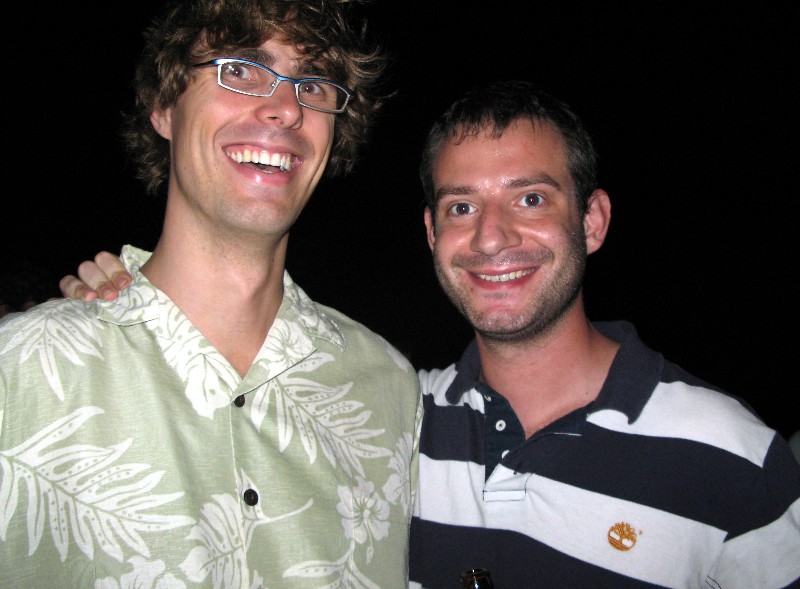 Peter and Steve 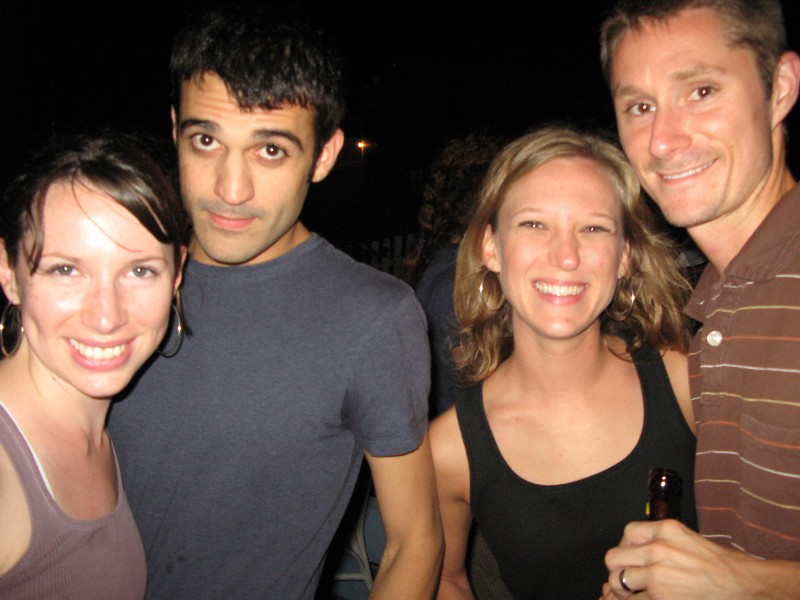 Britney, Ali, Anna, and Greg 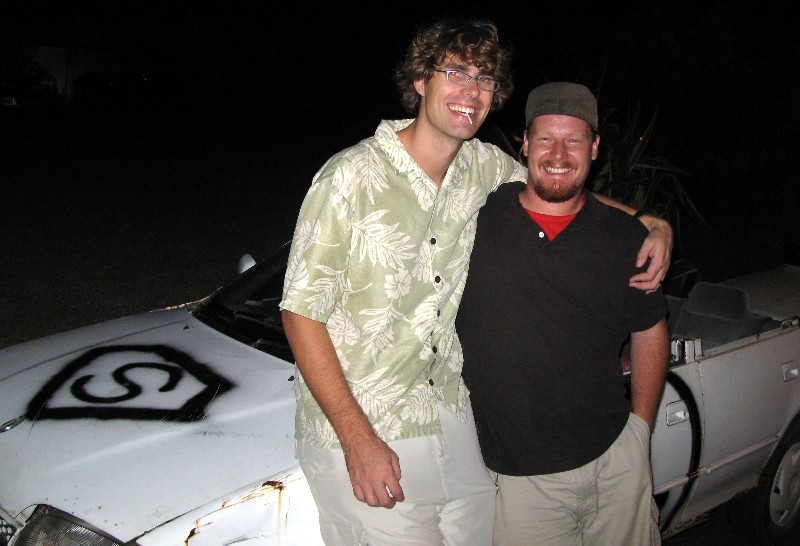 Two Peters. One SuperCar. |
| Our end-of-semester revelry
was brief this time around, as we left Grenada the very day of Peter's
last final exam in order to maximize our time with family this holiday
season. |
| Holidays
in Colorado |
| Back to Grenada Home Page |
| Contact Us |